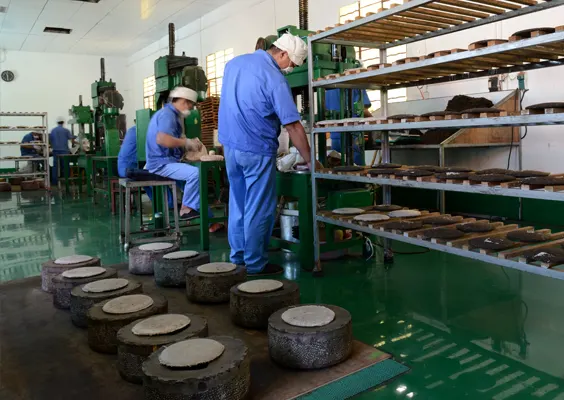Atelier de fabrication
In this page header section, you can provide details about the purpose of the page. This helps users quickly understand what to expect from the page content.
Artisanal Pu’er Tea Production
Experience our careful process, from fresh leaf harvesting to quality packaging, ensuring premium taste and hygiene.
01
Fresh Leaf Harvesting
The Pu’er tea produced by our company is sourced from ancient tea mountains such as Mansong, Iceland, Lao Banzhang, and Guafengzhai. Our harvesting standards and storage requirements are strictly enforced to ensure the integrity, freshness, and uniformity of the fresh leaves.
02
Initial
Processing
Our initial processing facilities are strategically located among the major ancient tea mountains. We process the freshly picked leaves in the shortest possible time, ensuring the highest quality of the raw materials.
03
Sun-Drying Greenhouse
In earlier years, sun-drying of green tea was done on muddy ground or sieves, which inevitably allowed many non-tea substances to mix in. Now, Longyuanhao employs well-ventilated, dust-free sun-drying greenhouses elevated above the ground, ensuring the hygiene and quality stability of the raw tea materials.
04
Raw Tea Warehouse
Our raw tea is stored with strict quality control, organized by grade, with each package labeled in detail. The labels indicate the origin, quantité, grade, purchase date, and storage date, preventing moisture-related issues.
05
Fermentation Workshop
The fermentation of Pu’er tea through wet piling is a slow process involving microbial and both enzymatic and non-enzymatic oxidation. This is the core process that shapes the unique qualities of Pu’er tea. Our fermentation workshop is built to comply with Grade A food safety certification standards for Pu’er tea. We use the unique Baisha spring water from the Menghai region, laying a solid foundation for the top-quality of Longyuan Pu’er tea.
06
Refining Workshop
Well-fermented Pu’er tea undergoes processes like sifting, circular screening, and air selection to remove yellow leaves, dust, and other impurities. By adjusting the size of the sieve holes, we classify the tea into different grades.
07
Sorting
Atelier
All sorting of tea leaves is done manually. Based on processing requirements, we meticulously sort the tea, removing leaves, stems, fruits, flowers, seeds, and other impurities. Only after thorough inspection and approval can the tea be piled for blending.
08
Pressing Workshop
Our pressing workshop utilizes both manual and machine pressing techniques. The perfect blend of traditional and modern Menghai pressing methods ensures that our compressed tea meets the diverse needs of different customer groups in terms of appearance and tightness.
09
Packaging Workshop
The packaging workshop is built according to Grade A food safety certification standards for Pu’er tea. It is divided into inner and outer packaging areas. The tea to be packaged must be elevated at least 20 centimeters off the ground to maximize hygiene.

Our Tea Factory
Welcome to our tea factory, where tradition meets innovation. Our facility is equipped with state-of-the-art technology, ensuring the highest quality in every step of tea production.
Production Workshop
In our production workshop, we combine skilled craftsmanship with advanced techniques. Each stage, from processing to packaging, is meticulously managed to guarantee premium Pu’er tea.


Manual Sorting
Our tea leaves are hand-sorted by skilled workers. This meticulous process ensures that only the finest leaves are selected, enhancing the quality and flavor of our tea.
Pressing Workshop
In the pressing workshop, we utilize both traditional and modern methods to shape our compressed tea. This blend of techniques ensures that our products meet diverse customer preferences while maintaining exceptional quality.

Restez connecté avec nous
Laissez créer ensemble
Il a10,000 notre jardin de thé, jardin de thé écologique, jardin de thé biologique, méthode moderne et ancienne de torréfaction du thé, accepter du thé en vrac, personnalisation de la laine, valeur de production annuelle de 100,000 tonnes. Les gens du thé internationaux sontbienvenue pour visiter l'usine.